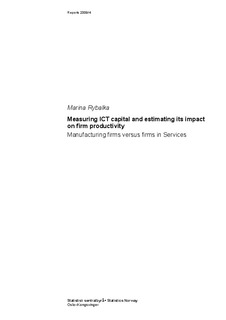| dc.description.abstract | Information and communication technology (ICT) is one of the most dynamic areas of investment as well as a very pervasive technology. The possible benefits of ICT use for a firm include among others savings of inputs, general cost reductions and greater flexibility of the production process. This technology may also stimulate the innovation activity in the firm leading to higher product quality and creating of new products. These innovation-enabling characteristics make ICT a potentially important driver of productivity growth. Since mid of the 1990s, a broad variety of empirical studies has emerged exploring the impacts of ICT on the firm productivity. While, the quantitative results from these studies vary substantially, they all find evidence on positive impact of ICT on firm productivity. However, the data limitations in most of these studies have not allowed comparing the effect of ICT on productivity among different industrial sectors.
This paper provides a comparative analysis of the impacts of ICT on the firm labour productivity among firms in Manufacturing and Services, as well as among firms in different service industries, based on the rich panel data of Norwegian firms in the period 2002-2006. The paper also explores the existence of complementarities between ICT and human capital in different industries. The measure for ICT capital is constructed and three different models are formulated based on the production function framework.The results are consistent with ICT having a positive impact on the firm labour productivity. They also show that accounting for the labour heterogeneity, i.e., for different skills of labour force, is important for not overestimating of the effect of ICT. Moreover, for all defined samples the estimation results show the evidence on complementarities between ICT and the use of high educated workers.
The results also indicate considerable differences between firms in Manufacturing and Services and between firms in different service industries. First, the importance of ICT for the labour productivity is much higher in Services than in Manufacturing, while the availability of high-skilled workers is more important in Manufacturing than in Services. Second, while for Manufacturing the relative importance of ICT capital for labour productivity is lower compared to non-ICT capital, for some service industries the impact of ICT capital on labour productivity is much higher than that one of non-ICT capital, i.e., Wholesale trade, Electronic processing and telecommunication and Technical services. Third, the gain of simultaneous use of ICT and high-skilled workers is higher in Manufacturing than in Services.
--- Informasjons- og kommunikasjonsteknologi (IKT) brukes stadig mer både i
husholdninger, næringsliv og offentlig sektor. Utviklingen i IKT-sektoren og den
omfattende utbredelsen av IKT-bruk i dagliglivet er en viktig kilde til mer effektive
transaksjoner både i samfunnet generelt og i næringslivet spesielt. Mange har av
den grunn hevdet at vi er inne i et viktig tidsskille i den økonomiske utviklingen,
og det har vært trukket paralleller til tidligere teknologiske revolusjoner som
utbredelsen av elektrisitet, forbrenningsmotoren og telekommunikasjon. Påstander
om en omfattende digital revolusjon underbygges med at IKT er en gjennomgripende
teknologi som øker produktiviteten i en rekke sektorer i økonomien.
Automatisering i industrien og innføring av elektroniske tjenester i varehandel,
bank- og forsikringssektoren er viktige eksempler på dette. | no_NO |
